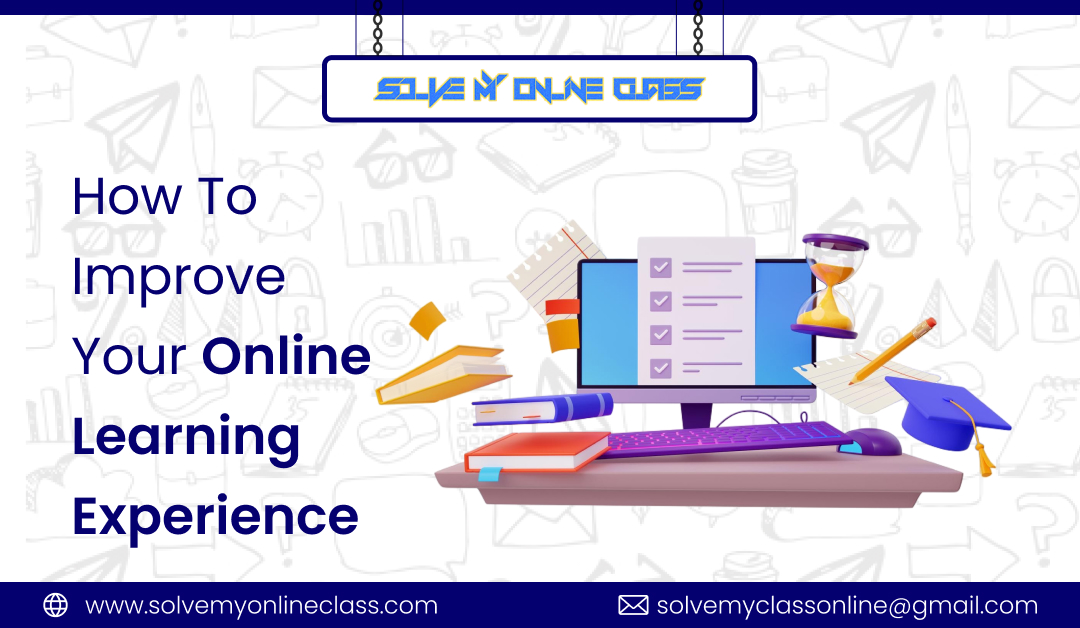Online learning has grown in popularity as a convenient and efficient approach to acquire knowledge and skills in the modern digital world. Making the most of your online learning experience is crucial, whether you’re taking the course to further your job, pick up a new interest, or finish your coursework. Here are some useful hints to enhance your virtual education experience.
1. Establish Specific Objectives:
Set attainable goals before beginning any online course. By the end of the course, what do you hope to have accomplished? Having a well-defined goal can help you stay motivated and concentrated. To help you stay on track, write down your goals and review them frequently.
2. Establish a Specialized Study Area:
A dedicated study area can greatly improve your educational experience. Select a space that is calm, cozy, and free of distractions. Make sure you have all the equipment you’ll need, including a computer, books, and a fast internet connection.
3. Create a Timetable for Studying:
Making a study calendar facilitates efficient time management. Set aside specified periods to study, and adhere to them. You’ll stay organized and make sure you cover all the required material with the aid of this regimen.
4. Maintain Your Organization:
Maintain the organization of your study materials. To stay organized and remember crucial dates, assignments, and notes, use digital tools, binders, or folders. You’ll save time and feel less stressed if you keep organized.
5. Take Occasional Rests:
It’s imperative to take regular breaks to keep attention and avoid burnout. Make use of methods such as the Pomodoro Technique, which has you study for 25 minutes and then take a 5-minute rest. You will be able to stay productive and improve your memory with this strategy.
6. Engage in Active Participation:
Participate fully in your online courses. Engage in dialogues, pose inquiries, and communicate with your teachers and fellow students. Engaging in active engagement enhances your comprehension of the subject matter and adds enjoyment to the learning process.
7. Make Use of the Resources Available:
Utilize every resource that your online course has to offer. This could involve readings, discussion boards, video courses, and more resources. Making use of these materials can improve your comprehension and offer a variety of viewpoints on the topic.
8. Get Assistance When Needed:
If you’re having trouble with a particular subject or assignment, don’t be afraid to ask for assistance. Speak with your teachers, enroll in study groups, or think about hiring a tutor. If you’re feeling overwhelmed, you can consider pay someone to complete your online course.
9. Make time management a habit:
The secret to succeeding in online learning is time management. Set deadlines, prioritize your work, and refrain from putting things off. To stay on top of your tasks, utilize calendars, planners, and to-do lists.
10. Continue to be Inspired:
In an online learning setting, maintaining motivation might be difficult. Try rewarding yourself when you finish things, establishing little goals for yourself, and reminding yourself of your objectives as strategies to stay motivated.
11. Pay for Help When It’s Needed:
It can be somewhat demanding at times to juggle employment, personal obligations, and online coursework. If you’re having trouble, you might think about paying someone to complete your online course or test. Services that offer the assistance you require to succeed include “take my online course,” “take my online course,” and “pay someone to take my online course.”
12. Participate in Online Forums:
Participating in online forums associated with your course can offer extra assistance and materials. These forums can provide insightful information, helpful hints, and support from other students.
13. Develop Your Technical Proficiency:
A solid understanding of various digital tools and platforms is often necessary for online learning. Make the time to improve your technological abilities, including utilizing video conferencing technologies, navigating learning management systems, and troubleshooting typical technical issues.
14. Take Care of Your Health:
Your capacity to learn well is highly dependent on both your physical and mental well-being. Make sure you’re receiving regular exercise, eating a balanced diet, and getting enough sleep. To maintain mental clarity and focus, engage in stress-reduction practices like mindfulness and meditation.
15. Consider What You’ve Learned:
Give your newfound knowledge some thought and consider how you may use it in your personal or professional life. Thinking back on what you’ve learned might help you remember it and pinpoint places where you can get better.
Conclusion:
It takes self-care, efficient time management, organization, and active participation to improve your online learning experience. You may maximize your online learning experience by establishing clear objectives, designating a specific study area, maintaining organization, and asking for assistance when necessary. Paying someone to take your online course or test can be an option if you’re feeling overburdened. In the end, an effective and fulfilling online learning experience will result from maintaining motivation and engagement.






